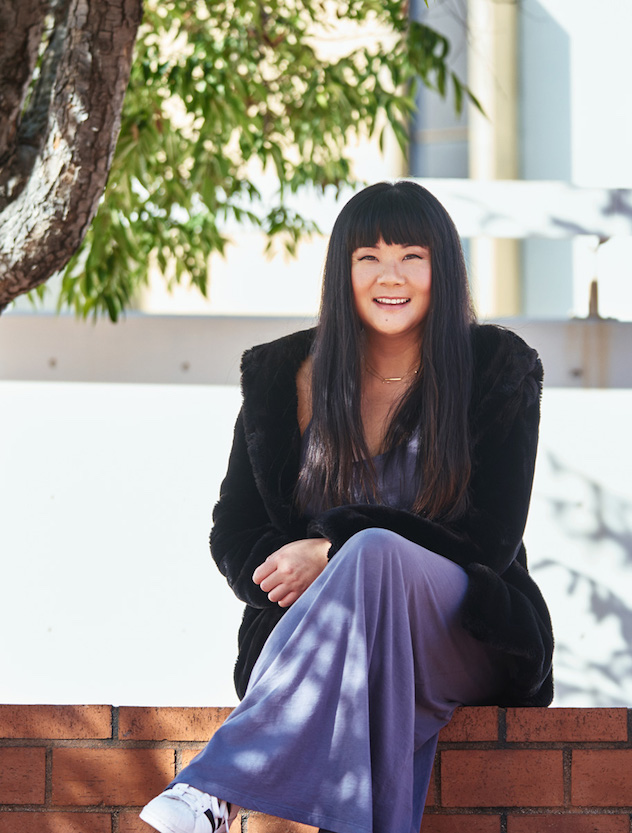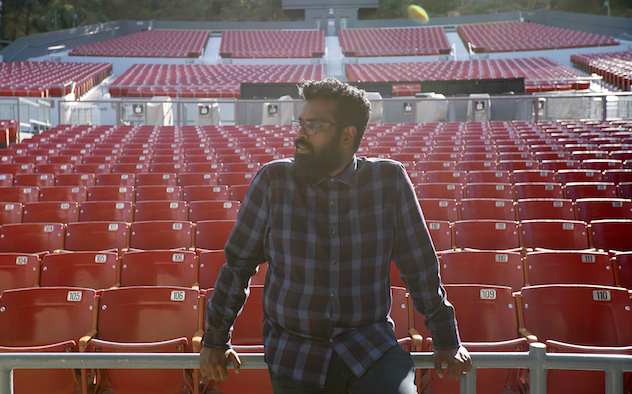Jenny Yang’s story could easily double as the premise of an Asian American sitcom: She grew up in a diverse neighborhood in Torrance, California, to Taiwanese immigrant parents. After nailing school, Yang went on to enjoy a brief career in labor movement politics.
Then, she gave it all up for stand-up comedy.
“I tried being the ‘good Asian,’” Yang, a comedian and writer, said. “And it was all right and I benefited from it. But deep down, I knew it wasn’t fulfilling. Deep down I knew I wasn’t fully utilizing my spirit and my creativity and my skills.”
Yang is the producer of shows such as Disoriented Comedy, the first stand-up comedy tour featuring mostly female Asian American comics, and The Comedy Comedy Festival: A Comedy Festival, a self-explanatory comedy event that is a collaboration with the Japanese American Cultural and Community Center and stars many familiar Asian American faces from the comedic and Hollywood scene.
Yang’s goal as a comedian is to allow her audience to know her true self. “I’m trying to be as whole a human as I can be on stage,” she said.“My goal in stand-up is that you’ll get to see as much of me as possible, not just the parts of me that are palatable, acceptable or respectable.”
Yang built up a social media following by speaking her truth. While she initially wanted to keep her accounts centered on comedy and community, she changed her approach to outreach after the death of Michael Brown, Jr. in Ferguson in 2014 and the resulting Black Lives Matter movement. “It was so completely inhumane,” Yang said about the incident. “It felt so unjust and so distasteful and wrong that I just felt like expressing the full force of my emotion behind how wrong I felt it was. That was a huge turning point for me. It was a conscious decision for me to say, ‘I don’t care if you disagree with me, I just need you to understand how completely f–d up this is.’”
She began using her Twitter as a way to share information about causes and issues that she cared deeply about. With a master’s degree in urban planning and a former career as a labor union activist, Yang is no stranger to organizing and mobilizing, even online. Yang would comb through articles, read through them and pick out the best of the bunch to share on her account, hoping that it would inform her followers and inspire them to take action. “I was posting so much during that time that people would pull me aside and say, ‘I really appreciate you sharing the news, I just go online to read what you’re reading because I know you’re gonna pick out the stuff that I may not see and I’ll stay up to date,’” she said.
But community-building doesn’t end online for Yang. In fact, the motivation behind producing the mostly-female and mostly-Asian comedy tour Dis/Orient/ed Comedy began as an effort to find her own community, a way to “keep my morale up, keep myself feeling like I’m not alone in what I am doing.”
The tour has sold out several times, baffling other producers struggling to find the same success. They’ve reached out to Yang for advice. The solution is pretty simple, at least according to Yang: “Spend most of your adult life building connections within the Asian American community inside and outside of work, and then create shows that basically serve this underserved market. That’s the solution. There was a need.”
Fulfilling needs is central to Yang’s artistry and online activism, particularly the need to speak up and be heard. “We have infinity wrapped up inside of us,” Yang said. “And there’s so much that needs to be said.”
Growing up in Torrance, she had the benefit of being surrounded by people who looked like her. “They were all-around people,” she said. “We were good at school. We were athletic. We did sports. We were social. We went to dances. We did service organizations, and I was so fortunate that I was around people like that.”
While that helped Yang realize that she could be anything she wanted, high school can still be a challenging place to express oneself honestly. As a teenager, Yang got caught up in the exclusivity of cliques in her high school, pressuring her to conform to a group’s expectations and stifle her creativity.
Yang was able to find a way to take conformism and turn it into something resembling creative expression — by channeling it into her schoolwork “[I was] the good Asian girl whose job it was to get straight A’s,” she said, but she “would make silly book reports that no one asked me to do, but I would do it in character.” Even then, she itched to perform. “When I look back, I had all these different desires and impulses to express myself, but the most acceptable way was to do it through school.”
It wasn’t until her senior year when Yang decided to switch cliques and join her school’s theater club that she realized the joy of being able to tell her own story (both the good and bad parts), not just that of the Good Asian Girl. She carried this perspective into her comedic career years later. “That’s a problem for Asian Americans who want representation,” Yang said. “We get upset if we are seen negatively. I want to reserve the right to be seen negatively and positively. I want us to be the heroes and the villains. That’s what good art does, it gives people a more complex look at who we are.”
Yang’s need to be heard continues to fuel her drive. “What drives me is feeling a sense of disempowerment and injustice, feeling like I’m not being heard,” she said, “balanced with a huge dose of just wanting to be silly and free.”
This article is a part of a series of portraits and stories, in celebration of Asian Pacific American Heritage Month, on API women who use their perspectives and voices to speak up and impact their communities. Read more here.







